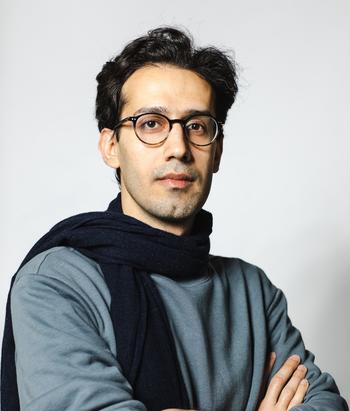Omid Mashhadi Abdolrahman

Counter Narrative Potency of Amateur Performance: An Aesthetic Strategy
Raum JK 33/137
14195 Berlin
Omid Mashhadi Abdolrahman is a scholar of performance studies as well as a theatre director and performance artist. In 2011, he founded and has since co-directed the research-artistic group “Still Life” in Iran, which aims to merge the performing and visual arts, while adopting the theoretical achievements within disciplines in the social sciences and humanities, such as media studies, cognitive linguistics, cultural studies, and sociology. His research interests centre on the interrelation between cultural transformations and the concepts of performativity, theatricality and mediality, both in literary-artistic productions and creative-subversive practices of everyday life. Against this backdrop, he investigated the effects of the mediality of online platforms on the contemporary landscape of critical literature for his MA thesis (entitled “A Study on the Impact of the Theatre Critiques and Reviews in Social Networking Websites on the contemporary performances in Tehran). His PhD project grew out of his MA thesis, transferring and expanding the study of ‘literature outside the editorial hierarchies’ from the textual sphere of criticism to the intermedial realm of performance, focusing on the political and cultural implications of amateurism in performing arts.
He was a Fellow at the EXC “Temporal Communities” from January to June 2021, and Since October 2021, He is a member of both the Friedrich Schlegel Graduate School of Literary Studies and the EXC “Temporal Communities”, where he works as a doctoral researcher on the project “Counter Narrative Potency of Amateur Performance: An Aesthetic Strategy”.
Counter Narrative Potency of Amateur Performance: An Aesthetic Strategy
The current Ph.D. project aims to scrutinize amateurism in performance as a political force and an aesthetic strategy and to investigate its capacity to counter hegemonic, cultural grand narratives. Using both historical and contemporary case studies from Iran and Germany, it focuses on how amateur performance can serve as resistance and point of opposition in the face of commoditized culture and institutionalized sociocultural rationalities, consequently constituting communities of alterity, both aesthetically and politically. A further focal point of the project concerns the question of how amateur performance responds to the general question of identity, both communal and individual (from the standpoint of its temporal constitution).
This project firstly posits that amateur performance follows peculiar medial principles and produces its own material culture, introducing specific aesthetic and semantic patterns. In this context, the project analyzes the reciprocal relationship between the concept of counternarrative and the mediality of amateur performance, examining the mechanism through which the intertwining of the triad “fictionality, materiality, and temporality” is reconfigured in the amateur sphere. Against this backdrop, the second hypothesis focuses on the tactical dimension of amateur performance and investigates its inherent capacity to serve as a performative counternarrative to manipulated collective memory. The third hypothesis contends that amateur performance contributes to the performative constitution of social identities. This gives rise to some key questions: how could amateur narratives, as creative acts, serve social competition as well as the formation or reclamation of social distinctiveness and identity, especially that of minority communities? How can amateur performances enact and embody the narratives of subcultures? How do amateur performing ensembles operate as communities of practice, emerging against established criteria of inclusion and exclusion, and implying a form of co-existence that questions and subverts the binaries of own vs. foreign, homeland vs. the rest of the world?
The project takes a transnational and trans-temporal approach and relies on participant observation as well as on discourse analysis within the framework of the ‘grounded theory’ methodology. The aim is to establish a dialectical relationship and aesthetic discourse between past achievements of amateur performance and contemporary notions and manifestations of amateur practices in performing literary realms. Further, the developmental trajectory of the amateur field in one nation will be reconciled with that of another to illuminate the divergences and convergences of two histories and cultures, namely in relation to the manifestations of sociopolitical and aesthetic orientations in their narrative designs as well as to the creative strategies applied in confronting norms of inclusion and exclusion.




